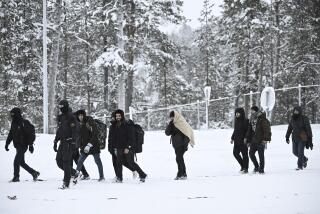Soviet Union Exporting Crime to Finland
- Share via
HELSINKI, Finland — Irina and Monika can earn up to $1,000 a night each as prostitutes in Helsinki, more than 10 times the pay for regular, legal jobs back in the Soviet Union.
Gun shops report increased offers to supply illegal Soviet weapons. Tourists from the Baltics openly sell smuggled alcohol, and contraband drugs from Estonia are freely available in Helsinki.
“Everything is so expensive here, but so are we!” said Monika, 23, from Riga, Latvia.
Irina, 25, was born in Kiev but came here from Tallinn, Estonia. “There was nothing in the stores there, so the work seemed pointless and I knew this place was paradise in comparison,” she said.
Prostitution has become part of Helsinki’s night life in the year since the Kremlin relaxed its travel rules and large numbers of Soviet citizens began visiting Finland.
“We never really had a market for prostitution on any scale here before--just a few girls selling their services in hotel bars,” said Kari Rantama, deputy chief of the National Bureau of Investigation.
Now, he said, prostitutes “are everywhere--in bars, restaurants, even quite openly on market squares.”
Smugglers from the Soviet Union can get much more for their goods in Finland than at home.
During a two-month campaign against smuggling, customs officials confiscated 250,000 anabolic steroid pills from Estonia. That was more than twice the number seized in all of 1990.
Sports officials say visiting Soviet teams often smuggle liquor into Finland. In one case, they said, members of a basketball team tried to bring 200 bottles across the border in a train compartment.
One afternoon Soviet visitors parked a van in a Helsinki suburb and sold liquor from it to passersby.
For many Soviets, “particularly from Estonia and Leningrad, this is the gateway to the West, just as sometimes Helsinki has been dubbed the gateway to the East for Western politicians,” Rantama said.
“According to the findings of Interpol,” the international police agency, “the Tallinn-Helsinki-Berlin axis is a reality,” he said. Rantama cited an Estonian with close connections to the Berlin underworld who smuggled about 130 pounds of marijuana to Finland.
He said Soviet criminals still are relatively few in Finland, accounting for only 183 of 41,000 arrests in 1990, but added that crimes committed by Soviet citizens increased fourfold in the first three months of 1991.
“As travel from the Soviet Union continues to grow, we can expect a much greater rate of increase for the rest of the year,” he said. “As for 1993, then we really will be in a fix unless something drastic is done.”
A new Soviet law ending all restrictions on emigration and travel is expected to take effect in January, 1993.
Last year, 212,000 Finnish visas were granted to Soviet citizens, compared to 135,000 in 1989. Nearly half went to Estonians, whose language is related to Finnish.
A gun merchant said he had received more than a dozen offers of illegal Soviet arms in a few months.
“They are mainly Kalashnikovs,heavy weapons which can pierce bulletproof vests and armor-plated cars,” Runo Kurko, former weapons adviser to the Finnish police, said of the illegal guns. “This is heavy stuff, and it’s getting worse.”
No one can buy a gun legally in Finland without a police certificate. Armed robberies are increasing, however, and an estimated 100,000 illegal weapons have been added to the 2 million legal guns in a population of 5 million.
“During the past few months, we have come across very alarming evidence that organized Soviet crime is taking a firm foothold here in Finland, partly due to our links with the West,” Rantama said.
More to Read
Sign up for Essential California
The most important California stories and recommendations in your inbox every morning.
You may occasionally receive promotional content from the Los Angeles Times.










